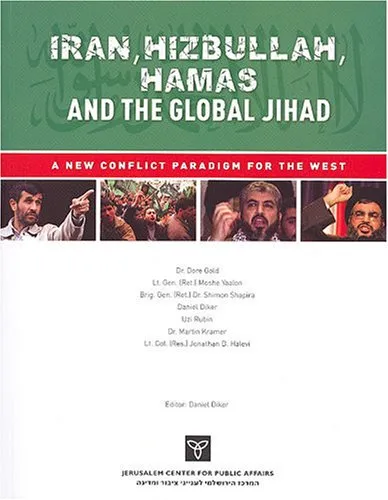Hamas: Politics, Charity, and Terrorism in the Service of Jihad
4.5
بر اساس نظر کاربران

شما میتونید سوالاتتون در باره کتاب رو از هوش مصنوعیش بعد از ورود بپرسید
هر دانلود یا پرسش از هوش مصنوعی 2 امتیاز لازم دارد، برای بدست آوردن امتیاز رایگان، به صفحه ی راهنمای امتیازات سر بزنید و یک سری کار ارزشمند انجام بدینکتاب های مرتبط:
معرفی کامل کتاب "Hamas: Politics, Charity, and Terrorism in the Service of Jihad"
کتاب Hamas: Politics, Charity, and Terrorism in the Service of Jihad نوشته متیو لوویت (Matthew Levitt)، اثر جامعی است که به تحلیل عمیق ساختار، اهداف، و تأثیرگذاری سازمان حماس به عنوان یکی از بازیگران کلیدی در منطقه خاورمیانه میپردازد. در این اثر، نویسنده تلاش میکند ارتباطات گسترده میان فعالیتهای خیریه، سیاسی و عملیات تروریستی حماس را تحلیل و روشن کند. از این رو، این کتاب منبعی ارزشمند برای افرادی است که به دنبال درک بهتر از ماهیت این سازمان هستند.
خلاصهای جامع از محتوای کتاب
کتاب Hamas به بررسی سه جنبه اصلی این سازمان میپردازد: جنبه سیاسی، جنبه خدمات اجتماعی و خیریه، و همچنین فعالیتهای تروریستی. متیو لوویت نشان میدهد چگونه حماس از شبکههای خیریه برای جلب حمایت مردم محلی استفاده میکند، در حالی که همزمان از منابع مالی این فعالیتها برای تأمین هزینههای عملیات نظامی و تروریستی خود بهرهبرداری میکند.
در این کتاب، مسائل مربوط به نحوه شکلگیری حماس، ایدئولوژی آن و نقشش در منازعات منطقهای به طور ویژه بررسی شده است. نویسنده نشان میدهد که چگونه این سازمان توانسته است تأثیر عمیقی در سیاستهای منطقهای و همچنین معادلات بینالمللی برجای بگذارد. لوویت همچنین تلاش میکند نقاط خاکستری و کمتر شناختهشده فعالیتهای حماس را برای مخاطبان خود روشن نماید.
نکات کلیدی کتاب
- تحلیل دقیق چگونگی ادغام فعالیتهای خیریه و تروریستی در ساختار حماس.
- بررسی نقش حماس در منازعات اسرائیل و فلسطینیها.
- نحوه تأمین مالی عملیاتهای تروریستی از طریق منابع خیریه بینالمللی.
- ارزیابی تهدیدات امنیتی جهانی ناشی از فعالیتهای حماس.
جملات معروف از کتاب
“Hamas is not simply a terrorist organization, it is a movement that has mastered the art of operating on multiple fronts: political, social, and military.”
“Charitable organizations linked to Hamas serve as dual-purpose instruments: fostering goodwill on the surface while funding jihadist activities in secrecy.”
چرا این کتاب اهمیت دارد؟
کتاب Hamas به دلایل متعددی از اهمیت بالایی برخوردار است. اولاً، این اثر تحلیلی جامع درباره یکی از پیچیدهترین و شناختهشدهترین سازمانهای سیاسی و نظامی خاورمیانه ارائه میدهد. دوماً، با توجه به تأثیرات جهانی حماس بر امنیت بینالمللی، درک عملکرد این گروه برای سیاستگذاران و کارشناسان امنیتی در سراسر جهان ضروری است. ثالثاً، نویسنده با قلمی روان و مبتنی بر تحقیق عمیق، درک بهتری از پویشهای ایدئولوژیک و استراتژیک حماس به خوانندگان ارائه میدهد.
این کتاب نه تنها برای کسانی که به حوزه مطالعات خاورمیانه علاقهمند هستند، بلکه برای افراد فعال در حوزه امنیت بینالملل، سیاست و روابط بینالملل نیز منبعی ضروری به حساب میآید. با مطالعه این کتاب، درک بهتری از نحوه عملکرد گروههای مسلح غیر دولتی و تأثیرگذاری آنها بر وضعیتهای سیاسی و اجتماعی منطقهای خواهید داشت.
Introduction
Hamas: Politics, Charity, and Terrorism in the Service of Jihad
"Hamas: Politics, Charity, and Terrorism in the Service of Jihad" is a compelling and meticulously researched book that provides a comprehensive understanding of Hamas, one of the world’s most controversial and complex organizations. Written by Matthew Levitt, an expert in counterterrorism and Middle East policy, the book delves into the multifaceted nature of Hamas, exploring its role as a social and political movement while shedding light on its integration of terrorism and violence into its activities. This book is an essential resource for policymakers, academics, and anyone seeking to comprehend how Hamas operates in the intricate web of Middle Eastern geopolitics.
Through rigorous analysis and diverse sources, including internal documents, court records, and firsthand interviews, Levitt offers invaluable insights into how Hamas balances its public-facing services and its covert militant operations. The text strikes a crucial balance between understanding the organization's ideological underpinnings and exposing its operational strategies. By exploring Hamas's political activities, social welfare efforts, and commitment to jihadist violence, this book paints a complete picture of its dualistic nature.
Detailed Summary of the Book
Hamas's appeal lies in its multifaceted structure—political, social, and militant—which allows it to function as a critical player in Palestinian society while furthering an agenda rooted in Islamist ideology. The book begins by charting the historical origins of Hamas in the late 1980s as an offshoot of the Muslim Brotherhood. Levitt illuminates how this movement arose in response to the Israeli occupation and quickly entrenched itself within Palestinian communities through a combination of charity work, political activism, and violent resistance.
The book's core examines Hamas’s extensive social welfare network, highlighting how the organization operates charities, schools, hospitals, and mosques to gain grassroots support. Levitt argues, however, that while these efforts appear legitimate, they often mask fundraising and recruitment for terrorist activities. The text provides concrete examples of how supposedly benign charity work directly supports armed campaigns and indoctrination. Using case studies and documented events, Levitt meticulously illustrates that philanthropy and militancy are inherently intertwined in Hamas’s operations.
Furthermore, the book focuses on Hamas’s militant arm, the Izz al-Din al-Qassam Brigades, laying out how this faction organizes and carries out attacks against Israeli targets, often with devastating consequences. Levitt also explores the group's use of suicide bombings, kidnappings, and rocket attacks as tools to advance its agenda. The examination of these activities reflects both the strategic sophistication and the human cost of Hamas’s commitment to violence.
Finally, the book provides an in-depth analysis of international involvement, particularly how funding from abroad enables Hamas to sustain its activities. Even as many governments officially designate Hamas as a terrorist organization, money continues to flow through convoluted financial networks. Levitt underscores the importance of international cooperation in shutting down these channels as a critical step in combating global terrorism.
Key Takeaways
- Hamas operates at the intersection of politics, social services, and jihadist violence, making it a uniquely difficult organization to classify and combat.
- Its social welfare programs are not standalone humanitarian initiatives but are often instrumentalized to further the group's radical and militant ideology.
- The organization's militant activities, including suicide bombings and rocket attacks, are carefully coordinated to achieve political and ideological objectives.
- Institutional support for Hamas spans international borders, requiring a global approach to disrupt its financial flows and operational networks.
- The dual role of Hamas as a political entity and a terror organization challenges traditional counterterrorism frameworks.
Famous Quotes from the Book
"The duality of Hamas—part terrorist group, part political movement, and part social organization—has enabled it to achieve a popular base of support while carrying out acts of violence with impunity."
"Charity in the service of terror is not philanthropy but a dangerous and potent weapon."
"Hamas has perfected the art of veiling its militant activities behind a façade of legitimate social services."
Why This Book Matters
This book is more than a study of a single organization—it is a window into the complex realities of how ideologies manifest in the real world, where charity can serve as a means to radicalize, and politics can cloak acts of terror. In an age where global terrorism poses critical threats to international stability, understanding groups like Hamas becomes imperative. Matthew Levitt's book matters because it demystifies a high-stakes topic, providing clarity on Hamas’s structure, motivations, and methods.
Moreover, the insights offered in "Hamas: Politics, Charity, and Terrorism in the Service of Jihad" challenge readers to think critically about the intersection of politics, religion, and violence. By peeling back the layers that obscure Hamas's true intentions, Levitt equips governments, organizations, and individuals with the knowledge required to develop more effective policies and strategies for combating extremism.
Finally, the book underscores the broader implications of how well-funded and well-organized groups can leverage local and global systems to perpetrate harm. For anyone grappling with questions of Middle Eastern politics, global security, or the roots of radicalization, this book is an indispensable resource.
دانلود رایگان مستقیم
شما میتونید سوالاتتون در باره کتاب رو از هوش مصنوعیش بعد از ورود بپرسید
دسترسی به کتابها از طریق پلتفرمهای قانونی و کتابخانههای عمومی نه تنها از حقوق نویسندگان و ناشران حمایت میکند، بلکه به پایداری فرهنگ کتابخوانی نیز کمک میرساند. پیش از دانلود، لحظهای به بررسی این گزینهها فکر کنید.
این کتاب رو در پلتفرم های دیگه ببینید
WorldCat به شما کمک میکنه تا کتاب ها رو در کتابخانه های سراسر دنیا پیدا کنید
امتیازها، نظرات تخصصی و صحبت ها درباره کتاب را در Goodreads ببینید
کتابهای کمیاب یا دست دوم را در AbeBooks پیدا کنید و بخرید
1314
بازدید4.5
امتیاز0
نظر98%
رضایتنظرات:
4.5
بر اساس 0 نظر کاربران
Questions & Answers
Ask questions about this book or help others by answering
No questions yet. Be the first to ask!















